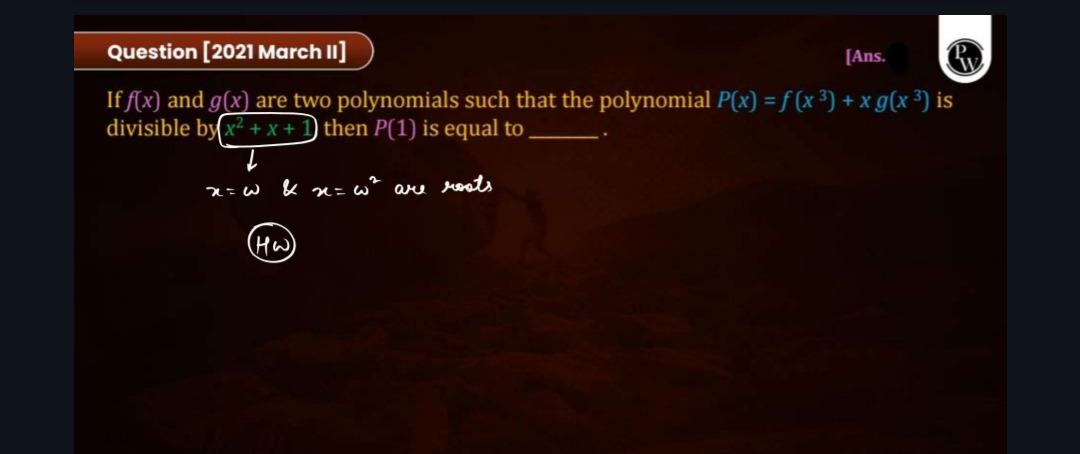Question
Question: If $f(x)$ and $g(x)$ are two polynomials such that the polynomial $P(x) = f(x^3) + x g(x^3)$ is divi...
If f(x) and g(x) are two polynomials such that the polynomial P(x)=f(x3)+xg(x3) is divisible by (x2+x+1) then P(1) is equal to ______.

0
Solution
To solve the problem, we use the property that if a polynomial P(x) is divisible by another polynomial Q(x), then all roots of Q(x) are also roots of P(x).
The polynomial P(x)=f(x3)+xg(x3) is divisible by (x2+x+1). The roots of the quadratic equation x2+x+1=0 are the non-real cube roots of unity, denoted by ω and ω2. This means that P(ω)=0 and P(ω2)=0.
We know the following properties of cube roots of unity:
- ω3=1
- ω2+ω+1=0
Step 1: Evaluate P(ω)
Substitute x=ω into the expression for P(x):
P(ω)=f(ω3)+ωg(ω3)
Since ω3=1, we have:
P(ω)=f(1)+ωg(1)
As P(ω)=0, we get our first equation:
f(1)+ωg(1)=0(Equation 1)
Step 2: Evaluate P(ω2)
Substitute x=ω2 into the expression for P(x):
P(ω2)=f((ω2)3)+ω2g((ω2)3)
Since (ω2)3=ω6=(ω3)2=12=1, we have:
P(ω2)=f(1)+ω2g(1)
As P(ω2)=0, we get our second equation:
f(1)+ω2g(1)=0(Equation 2)
Step 3: Solve the system of equations for f(1) and g(1)
We have the system of equations:
- f(1)+ωg(1)=0
- f(1)+ω2g(1)=0
Subtract Equation 1 from Equation 2:
(f(1)+ω2g(1))−(f(1)+ωg(1))=0−0
ω2g(1)−ωg(1)=0
g(1)(ω2−ω)=0
Since ω is a non-real complex number, ω2=ω, which means (ω2−ω)=0. For the product g(1)(ω2−ω) to be zero, g(1) must be zero. So, g(1)=0.
Substitute g(1)=0 back into Equation 1:
f(1)+ω(0)=0
f(1)=0
Step 4: Calculate P(1)
The question asks for the value of P(1). Substitute x=1 into the expression for P(x):
P(1)=f(13)+1⋅g(13)
P(1)=f(1)+g(1)
Using the values we found: f(1)=0 and g(1)=0.
P(1)=0+0=0.
